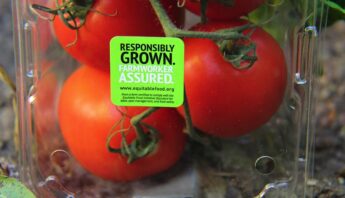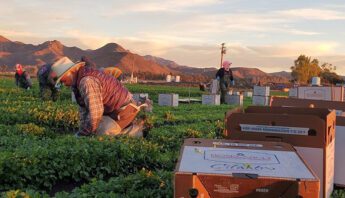We know that ending reliance on hazardous pesticides can only happen by creating healthy, just food and farming systems — and this means for all of us. One way we can do this? A safer, more transparent food chain.
This week, people across California are convening to learn more about and take action for Equitable Food Initiative (EFI) standards. The EFI program is designed to signify that workers harvesting your produce are treated well and compensated fairly, while also including standards for food safety and pest management. As a member of the EFI Board, and having worked for eight years to support and help build the initiative, I could not be more proud and enthusiastic about the EFI. But don’t take it from me, hear workers speak about what the EFI means to them — consider joining a livestream of our July 13 EFI event; RSVP “interested” for access to the livestream link.
PAN joins the EFI
Since the early 80s I’ve advocated for farmworker rights — first with the Ohio-based Farm Labor Organizing Committee (FLOC); then on a myriad of campaigns supporting the United Farmworkers (UFW) and the Oregon-based farmworker union PCUN with PAN. Together, we’ve worked to improve federal worker protections and banned or better-regulated some of the most hazardous pesticides, among many other collaborative efforts.
In 2010 I joined UFW, FLOC and PCUN, together with Farmworker Justice, National Farmworker Ministry, Oxfam America and others to design a program in which farmworkers could use the growing power of the marketplace to improve company policy as a means to improve workers’ lives, while continuing their unions’ work to win collective bargaining agreements. Three years later, the multi-stakeholder EFI published its first three-part standard (labor rights, food safety and pesticide reduction) and launched its innovative workforce development model, bringing voice and agency to now more than 22,000 workers from Canada to Mexico.
The EFI staff, including a traveling team of bilingual trainers, has successfully trained on-farm leadership teams on 27 EFI-certified farms and negotiated fully participatory agreements with major buyers.
Growing the EFI
To train on-farm leadership teams and become EFI-certified requires investment; EFI-certified growers need more buyers. While the EFI is deep in conversations with other large buyers and growers, the time is right for consumers to lend a hand to the initiative. Together, we’re learning about next steps and how to get involved with EFI’s efforts for farmworker justice – now’s the time to join us. RSVP “interested” for access to a livestream link of our July 13 EFI event.
Moving public policy
PAN has always worked for public policy reform — a must to ensure that all pesticide-affected people are protected from the hazards of exposure to pesticides, and workers are provided a dignified workplace with fair compensation.
Policymakers, however, rarely lead policy reform efforts. Rather, the leaders in developing good food and agrculture solutions are those most impacted by our food and agriculture system. And, in the meantime, if industry players are encouraged or enticed to make practice changes that better protect workers, consumers and the environment, and their bottom line, then public policy can follow.








